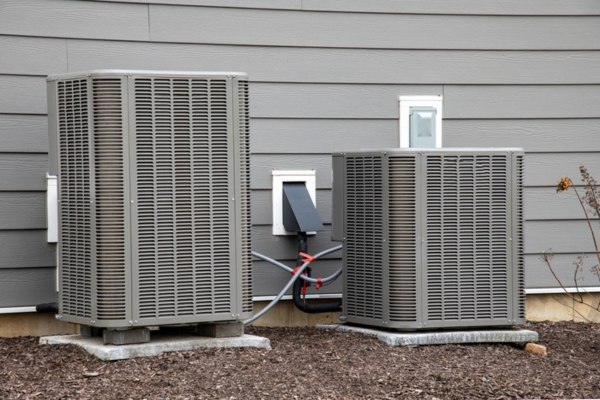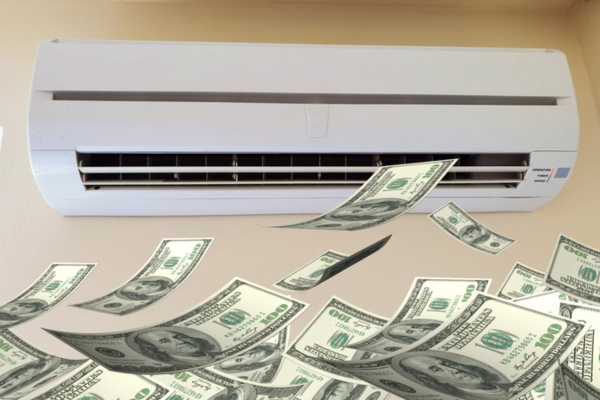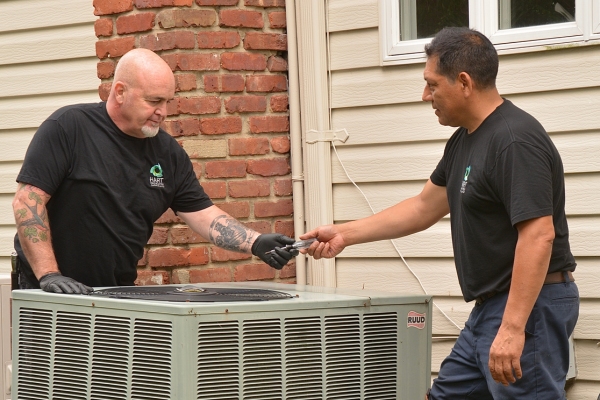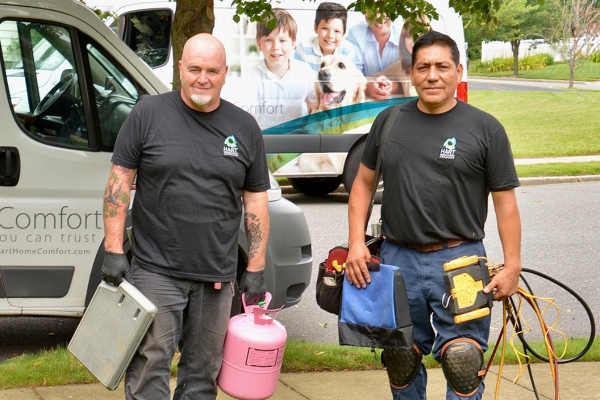Dealing With Rust On Air Conditioner Condensers: What You Should Do

The presence of air conditioner condenser rust can greatly affect their function and durability. When rust sets in, it undermines the condenser’s ability to efficiently transfer heat, potentially causing the entire system to fail. In this feature, Hart Home Comfort delves into the critical details concerning rust on air conditioner condensers.
We’ll cover what leads to rust formation, how it impacts the unit’s ability to cool, and the best strategies to prevent these issues. Gaining insights into the effects of rust on air conditioner condensers is vital for ensuring your cooling system operates at its best and enjoys a longer service life.
Understanding Air Conditioner Condenser Rust: What You Should Know
Table of Contents
- 1 Understanding Air Conditioner Condenser Rust: What You Should Know
- 2 Conclusion
- 3 Call Hart Home Comfort for Your HVAC Needs
We’ll begin by examining the reasons behind the air conditioner condenser rust accumulation in your unit, its influence on your system’s efficiency, the methods professionals employ to eliminate rust, and strategies to avoid such issues moving forward.
Primary Reasons for Air Conditioner Condenser Rust

Rust, known scientifically as iron oxide, occurs when iron reacts with oxygen and water. Key factors contribute to rust on air conditioner condensers, notably:
- Air Conditioner Condenser Moisture: Condensers face constant exposure to moisture as they are positioned outdoors. Water accumulation on coils, without efficient drainage, can initiate rust.
- Elemental Exposure: Being outdoors exposes condensers to severe weather, including rain, snow, and extreme temperatures, which can hasten rust formation.
- Corrosive Conditions: Condensers in regions with high pollution, chemicals, or saltwater face a greater risk of rusting.
- AC Maintenance Neglect: Inadequate or sporadic upkeep leads to dirt, debris, and moisture buildup on the condenser, fostering a rust-conducive environment.
- Physical Harm: Dents or scratches to the condenser can breach its protective layer, exposing the metal to increased rust risk.
Don’t let rust compromise your cooling comfort! Call Hart Home Comfort today for expert insights and solutions.
The Impact of Rust on AC System Efficiency
Rust significantly undermines the cooling efficiency of AC units in several ways:
Diminished Heat Transfer

Rust on condenser coils forms an insulative barrier that disrupts the exchange between the circulating air and the refrigerant within. This interference hampers the condenser’s ability to expel heat adequately, diminishing its cooling capability.
Impaired Airflow of the AC Unit
Rust may lead to deformation or clogging of the condenser’s fins or blades, obstructing air movement through the coils. This limitation decreases the system’s heat dissipation efficiency, impairing the AC’s cooling potential and making it challenging to achieve set temperatures.
Increased Strain on the Cooling System

When rust impairs heat transfer and airflow, the air conditioning system must run longer and work harder to cool effectively. This prolonged operation consumes more energy and subjects the system to additional stress, which can lead to failures or breakdowns.
Shortened Air Conditioner Lifespan
Rust hastens corrosion, leading to significant long-term damage to the condenser. This corrosion weakens the structural integrity of the coils and other components, reducing the overall lifespan of the cooling system.
Professional Rust Removal from Your Outdoor AC Unit

Addressing rust on an AC condenser involves precise actions and the right techniques to prevent additional harm. Engaging experienced HVAC professionals with the necessary expertise and tools for a safe and successful restoration is essential. DIY attempts at rust removal could result in more damage or pose safety risks. Below is a summary of the procedures an HVAC service might undertake to tackle rust on your AC condenser:
- Initial Air Conditioner Assessment: An HVAC technician begins with a detailed examination of the condenser unit to evaluate the severity of the rust damage. This step is crucial to identify whether the rust is merely on the surface or has led to deeper structural or operational problems.
- AC Unit Rust Remediation: Based on the rust’s severity, the HVAC specialist may use different strategies to address it, including applying specialized rust removers, converters, or abrasive methods to clear rust from impacted sections. This phase demands meticulous skill and knowledge to prevent harm to the condenser’s sensitive parts.
- Protective Coating: After eliminating the rust, the technician may apply a protective coating or paint to the condenser to prevent future corrosion. This layer shields against moisture and external elements prone to causing rust.
- Examination & Air Conditioner Component Renewal: The HVAC professional will also meticulously check the condenser’s inner parts for rust damage. Should critical components such as coils or fins show considerable deterioration, replacements will be suggested to ensure the unit operates at peak efficiency.
- Ongoing Cooling System Care & Rust Prevention: Following the rust remediation, the technician will offer guidance on maintenance practices to help avoid rust in the future. Suggestions will likely encompass routine cleaning, regular inspections, and ensuring adequate drainage to reduce the risk of moisture buildup.
Keep your cooling system running smoothly and rust-free with Hart Home Comfort’s professional maintenance services. Schedule an appointment now!
Effective Preventive Measures Against Air Conditioner Rust
Taking proactive measures can significantly decrease the likelihood of rust development and its negative influence on both the efficiency and lifespan of your air conditioning unit. Below are effective strategies to consider:
Consistent AC Unit Cleaning

Regularly clear away dirt, debris, and other particles from the condenser coils and fins that may hold moisture and speed up rusting. Employ a soft brush or vacuum for gentle removal. Opting for a professional HVAC technician’s expertise ensures a comprehensive and correctly executed cleaning.
Maintain Effective AC Unit Drainage
Confirm that the condensate drain lines are free from blockages and fully operational. An experienced HVAC technician can effortlessly accomplish this, ensuring proper drainage to avoid water gathering near the condenser, which minimizes the chance of rust.
Utilize Protective Coatings for Air Conditioners
Coat the condenser’s metal parts with protective finishes or corrosion-resistant sprays to act as a defense against moisture and rust development. Seek advice from a professional regarding the most appropriate coatings or treatments for your condenser model.
Install a Shelter for the AC System
Installing a shelter or enclosure can significantly shield your condenser unit from the harsh elements, including rain, snow, and intense sunlight. This protective measure minimizes the chance of moisture buildup and contributes to your unit’s longevity. Nevertheless, consulting with an HVAC professional is vital to ensure that the shelter does not compromise the unit’s essential airflow.
Regular Air Conditioning Maintenance
Arrange for routine maintenance checks by qualified HVAC technicians, who can examine the condenser for rust or corrosion. These experts are equipped to carry out essential repairs, meticulously clean the coils, and offer advice on preventing future rust issues.
Thoughtful Condenser Placement
Opt for an installation spot that reduces the condenser’s exposure to corrosive elements like pollutants, chemicals, or salt water. This strategic location choice can significantly decrease the likelihood of rust formation.
Immediate Air Conditioner Repairs
Act swiftly upon observing any rust or corrosion on the condenser. Engaging an HVAC professional to repair or replace compromised parts is crucial in averting additional rust development and possible system breakdowns.
Protect your air conditioning system from any issues. Trust Hart Home Comfort for effective preventive measures and maintenance tips. Call today!
Conclusion
Effectively dealing with rust on an AC condenser is crucial for preserving its peak functionality and extending the system’s lifespan. Rust poses a significant threat to heat exchange, airflow, and the unit’s overall cooling ability. While there are DIY approaches for rust mitigation, engaging an HVAC specialist is essential.
These experts bring extensive knowledge, experience, and the right tools to address rust issues safely and efficiently. They can evaluate the severity of rust damage, conduct necessary repairs, and recommend strategies to ward off future corrosion. Relying on a professional ensures the condenser receives meticulous care, reducing the likelihood of additional harm and enhancing the system’s performance and durability.
Call Hart Home Comfort for Your HVAC Needs
Hart Home Comfort is the premier heating and cooling service provider in Nassau County, Suffolk County, and Queens, New York. Our team of professionally certified technicians excels in HVAC tune-ups, repairs, installations, and replacements, ensuring top-quality service for every client.
Understanding the importance of a comfortable and energy-efficient home, we offer competitively priced services designed to boost comfort and lower energy bills. Our experts are ready to assist with HVAC repairs or replacements, providing solutions that fit your budget. We guarantee satisfaction with every job.
To arrange a service appointment, call us. Benefit from our free, in-home estimates for informed decisions on your HVAC systems. Call Hart Home Comfort for exceptional heating and cooling services that exceed your expectations!
For any questions about what Hart Home Comfort can do for you, give us a call today. Click here to contact us now or call us at (631) 667-3200 to find out more! Click the link to view our service area.

Related Articles:
